The Best Face Serums are becoming more and more popular as skincare products in modern times. Skincare lovers love vitamin C-containing serums. But what is the purpose of a face serum? A face serum that is rich in active ingredients calms your skin and gives it all the nutrition it needs.
Serums help to treat acne and reduce wrinkles. Everything you need to know about using and experiencing the benefits of serums is right here.
What is a Face Serum?
A face serum improves the appearance of wrinkles, fine lines, dark spots, and dullness in your skin. It’s a premium skincare product with powerful elements.
Serums, in comparison to normal moisturizers, contain larger amounts of active components like vitamins and antioxidants.
Use it after washing your face, but before putting on moisturizer so that it can work its magic. With a face serum, your skin can look brighter, smoother, and happier.
Use of Best Face Serums
- Hydration:
Face serums keep your skin hydrated with ingredients like hyaluronic acid. - Brightening:
They use ingredients like vitamin C to brighten and balance the tone of your skin. - Anti-aging:
Serums with antioxidants and peptides help reduce wrinkles, making you look younger. - Acne-fighting:
Some serums contain salicylic acid to fight acne and clear pores. - Soothing:
If you have irritated skin, serums with aloe vera or chamomile can calm it down. - Targeted treatment:
Serums can fix specific issues, like dark spots or oily skin, depending on what’s in them.
The Benefits of Using Face Serums
- Deep Hydration:
Serums provide intense moisture to the skin, keeping it hydrated and preventing dryness. - Improved Skin Texture:
Their chemicals promote cell division, making the texture of the skin smoother and more fair. - Targeted Treatment:
Serums can address specific skin concerns like fine lines, wrinkles, dark spots, and acne, delivering powerful components directly to problem areas. - Improved Absorption:
In comparison with moisturizers, their lightweight form hydrates the skin more deeply, increasing the effectiveness of the active ingredients. - Brightening:
Many serums contain ingredients like vitamin C or niacinamide, which help to brighten the complexion and reduce dullness. - Youthful Appearance:
Frequent use of serums promotes the production of collagen, giving skin a young look and making it firmer as well as more elastic.
Choose the Best Face Serums for Your Skin Type
For best results, choose the Best Face Serums that suits your skin type. Firstly, identify what problem you have with your skin, such as dullness, aging, acne, or dryness. Next, think about your skin type: dry, oily, combination, or sensitive.
For oily skin, look for serums containing niacinamide or salicylic acid to reduce breakouts and control oil on oily or acne-prone faces.
For dry skin, Glycerin and hyaluronic acid are two examples of moisturizing substances that help to maintain skin moisture. Combination skin types require a well-balanced product that takes care of several issues without blocking pores.
To prevent irritation, people with sensitive skin should use light, fragrance-free serums. At last, perform a patch test before adding a new serum to your skincare routine, and consult your dermatologist if you have any concerns.
FAQ
Q1. How to choose serum for face?
Ans. To choose a face serum, identify your skin concerns, consider your skin type, look for key ingredients, and perform a patch test before incorporating it into your skincare routine.
Q2. Can face serum make skin glow?
Ans. Yes, face serums can make the skin glow by delivering potent ingredients like vitamin C or hyaluronic acid, which hydrate, brighten, and improve overall skin texture, resulting in a radiant complexion.
Q3. What is the right age to use serum?
Ans. The right age to start using a serum varies depending on individual skincare needs. Still, generally, it’s recommended to introduce serums into your skincare routine in your late teens or early twenties.


